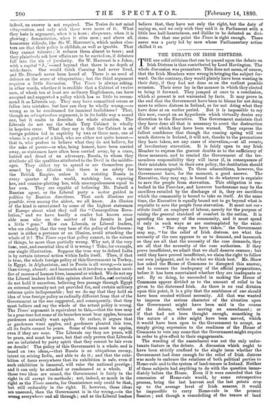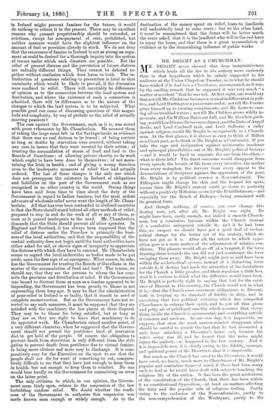THE DEBATE ON IRISH DISTRESS.
THE one solid criticism that can be passed upon the debate on Irish Distress is that contributed by Lord Hartington. The whole discussion was premature. This does not mean, of course,
that the Irish Members were wrong in bringing the subject for- ward. On the contrary, they would plainly have been wanting in their duty, if they had not done so on the earliest possible occasion. Their error lay in the manner in which they elected to bring it forward. They jumped at once to a conclusion, which at present is not warranted by facts. It may prove in the end that the Government have been to blame for not doing more to relieve distress in Ireland, or for not doing what they have done at an earlier period. But it is impossible to say this now, except on an hypothesis which virtually denies any discretion to the Executive. The Government maintain that they have done all that is necessary to avert the destruction of life of which they have been warned. They express the fullest confidence that though the coming spring will see much distress in Ireland, it will not, thanks to the precautions they have taken, see any cases of starvation,—at all events, of involuntary starvation. It is fairly open to any Irish Member to express the gravest doubts as to the sufficiency of these measures, and to remind the Government of the tre- mendous responsibility they will incur if, in consequence of their mistaken trust in their own policy, the destitution should become unmanageable. To these admonitions, however, the Government have, for the moment, a good answer. The Executive, they may say, is bound to do whatever is requisite to save the people from starvation. This obligation is em- bodied in the Poor-law, and however burdensome may be the sacrifices entailed by the discharge of it, they are sacrifices which the community is bound to take on itself. At the same time, the Executive is equally bound not to go beyond what is requisite to save the people from starvation. It must not con- stitute itself an employer of labour, merely for the purpose of raising the general standard of comfort in the nation. It is spending the money of the community, and it must spend it only in such ways as are contemplated by the exist- ing law. " The steps we have taken," the Government may say, " for the relief of Irish distress, are what the necessity of the case appears to us to demand, and inasmuch as they are all that the necessity of the case demands, they are all that the necessity of the case authorises. If they prove insufficient, we admit that we shall deserve censure; but until they have proved insufficient, we claim the right to follow our own judgment, and to do what we think best." Mr. Shaw has asked the House of Commons to disregard this answer, and to censure the inadequacy of the official preparations, before it has been ascertained whether they are inadequate or not. By so doing, he succeeded in making the House of Commons appear divided as to the amount of relief to be given to the distressed Irish. As there is no real division upon this point, it is a pity that the semblance of one should have been created without necessity. All that was wanted to impress the serious character of the situation upon the Government might have been said in the course of the debate, without moving an amendment ; or if that had not been thought enough, something in the nature of a rider might have been moved, which it would have been open to the Government to accept, as simply giving expression to the readiness of the House of Commons to vote any sums that the Government might require in order to give effect to their engagements.
The wording of the amendment was not the only unfor- tunate feature in the debate. A discussion which ought to have been strictly confined to the single issue whether the Government had done enough for the relief of Irish distress was made to embrace the relations of both political parties to Home-rule and to the system of land-tenure in Ireland. Neither of these subjects had anything to do with the question imme- diately before the House. Even if it were conceded that the concession of Home-rule would, by some retrospective process, bring the last harvest and the last potato crop up to the average level of Irish seasons, it would be impossible to carry Home-rule in the present Session ; and though a remodelling of the tenure of land in Ireland might prevent famines for the future, it would do nothing to relieve it in the present. There may be excellent reasons why peasant proprietorship should be extended, or evictions, except for non-payment of rent, prohibited, but neither measure would have the slightest influence on the amount of fuel or provision already in stock. We do not deny that the recurrence of famine in Ireland is not as strong an argu- ment as could be desired for a thorough inquiry into the system of tenure under which such disasters are possible. But the relief of present distress and the prevention of future distress are radically different things. They cannot be debated to- gether without confusion which does harm to both. The in- troduction of questions relating to prevention is fatal to that unanimity which would be likely to prevail, if the discussion were confined to relief. There will inevitably be differences of opinion as to the connection between the land system and destitution, and where the existence of such a connection is admitted, there will be differences as to the nature of the changes to which the land system is to be subjected. What possible good can come of discussing questions of this magni- tude and complexity, by way of prelude to the relief of actually starving peasants ?
The case against the Government, such as it is, was stated with great vehemence by Mr. Chamberlain. He accused them of taking the large sums left in the Savings-banks as evidence that there was no real distress to be feared ; of being content so long as deaths by starvation were averted, without taking any care to insure that they were averted by their action ; of trusting the accumulation of stores of food and fuel to the Boards of Guardians ; of allowing private charity to do work which ought to have been done by themselves ; of not main- taining the Irish in health ; and of giving a wrong direction even to the inadequate measures of relief they had actually ordered. The last of these charges is the only one which does not presuppose the existence in Ireland of obligations and liabilities on the part of the Government such as are recognised in no other country in the world. Strong things have been said from time to time about the duty of the Government in regard to Indian famines, but the most ardent advocate of wholesale relief never went the length of Mr. Cham- berlain. All that has ever been contended in civilised countries is that the State should stand behind all other methods of relief, prepared to step in and do the work of all or any of them, so soon as it proved inadequate to the need. Mr. Chamberlain demands that the State should prevent all other agencies. In England and Scotland, it has always been supposed that the relief of distress under the Poor-law is primarily the busi- ness of the local authorities, and that the responsibility of the central authority does not begin until the local authorities have either asked for aid, or shown signs of incapacity to appreciate the distress with which they have to contend. Mr. Chamberlain seems to regard the local authorities as bodies made to be put aside, upon the first sign of an emergency. What reason, he asks, has the Government for trusting the Boards of Guardians in the matter of the accumulation of food and fuel ? The reason, we should say, that they are the persons to whom the law com- mits the provision and distribution of relief. If the Government was bound to distrust them as soon as a famine appeared to be impending, the Government has been greatly to blame in not superseding them long ago. It may be that the administration of poor-relief in Ireland is so faulty, that it stands in need of complete reconstruction. But as the Government have not re- sorted to any such measures, it must be supposed that they are satisfied with the machinery the law places at their disposal.
They may be to blame for being satisfied, but so long as they are so, they are right to leave that machinery to do its appointed work. Mr. Chamberlain raised another point, of a very different character, when he suggested that the Govern- ment should not permit the pestilence bred of starvation diet to get hold of the people. Of course, the obligation to prevent death from starvation, is only different from the obli- gation to prevent death from pestilence due to virtual famine, in being more obvious and more easy to discharge. It is com- paratively easy for the Executive on the spot to see that the people shall not die for want of something to eat, compara- tively difficult to see that they have just enough to keep them in health, but not enough to keep them in comfort. No one would bear hardly on the Government for committing an error on the latter point.
The only criticism to which, in our opinion, the Govern- ment seem fairly open, relates to the suspension of the law forbidding outdoor relief. We doubt whether the readi- ness of the Government to authorise this suspension was made known soon enough or widely enough. As to the destination of the money spent on relief, loans to landlords will undoubtedly tend to raise rents ; but on the other hand, it must be remembered that the farms will be better worth the rents asked, that it is the landlord who will in the end have to repay the loans, and that there is a great accumulation of evidence as to the demoralising influence of public works.



































 Previous page
Previous page